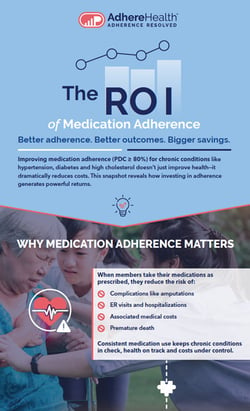Medication Adherence ROI: Turning Small Investments into Big Returns

What’s the true ROI of a medication adherence program? For Medicare Advantage and other health plans, the numbers speak for themselves. Check out our infographic to see how better adherence in chronic conditions like diabetes, high cholesterol and hypertension translates into real, measurable savings.
Get the full picture:
- How modest spending on essential medications delivers outsized financial gains
- The link between higher adherence rates, and fewer hospitalizations and ER visits
- Why a partner focused on improving engagement is key to unlocking these results
Download the infographic now and discover how smarter adherence strategies drive healthier outcomes and stronger financial performance.
Download the Infographic
Additional Resources
New White Paper
Guiding the Adherence Journey: Transforming Engagement into Outcomes for Medicare Advantage
In this white paper, you'll learn how a year-over-year strategy, powered by behavioral science, predictive analytics and coordinated outreach, helps your plan.
Blog
As D-SNP Enrollment Grows, So Does the Need for Smarter, More Integrated Support
With federal rules pushing for better integration of Medicare and Medicaid benefits—and Star Ratings harder to achieve—health plans need more personalized strategies to meet the moment.
Checklist
How to Improve Adherence in Even the Hardest-to-Reach D-SNP Populations
We’ve created a practical checklist to help health plans tackle the biggest barriers to D-SNP engagement and medication adherence.
Related Content
Blog
Top 5 Reasons Health Plans Win with a Multi-Pronged Medication Adherence Approach
Learn how leading plans are embracing a multi-pronged adherence approach.
White paper
Resolving Medication Adherence Challenges
Gain the insights you need to close gaps in care, reduce avoidable costs and improve your Star Ratings performance.
Blog
Eight Ways to Increase Member Engagement: Best Practices for MA Health Plans
Get the roadmap to drive meaningful engagement and better health outcomes.
